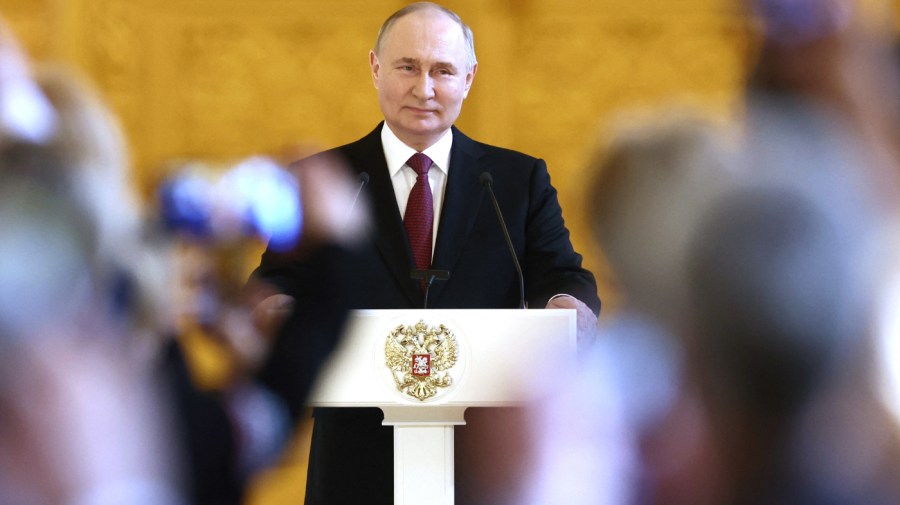Politics
Report Calls for Rethink of U.S. Russia Strategy

A bipartisan committee, tasked with promoting democracy and human rights in post-Soviet nations, is urging the United States to abandon the outdated framework of post-Cold War relations with Russia. They are advocating for the designation of Moscow as a “persistent” threat to global security.
In a report obtained ahead of its official release, the Helsinki Commission emphasizes the need for Washington to rethink its strategy toward Russia—similar to the approach taken with China in recent years—and to allocate resources accordingly.
One of the key components of the report focuses on ensuring that Ukraine prevails in its ongoing defense against Russia. It calls for substantial military and humanitarian aid to Kyiv, as well as permitting Ukrainian forces to conduct strikes deep within Russian territory using U.S. weapons.
The policy recommendations presented in the report extend beyond the current commitments made by the Biden administration to Ukraine, and they are at odds with the views of former President Trump, the Republican presidential candidate, and his supporters in Congress.
Trump has consistently argued that the United States is investing too heavily in European security matters. He is also promoting a direct negotiation strategy between Ukraine and Russia, engaging with leaders like Vladimir Putin.
However, Rep. Joe Wilson (R-S.C.), who chairs the Helsinki committee, has expressed skepticism about the likelihood of Trump effectively negotiating with Putin. He stated, “There’s no doubt in my mind that Donald Trump will recognize Putin’s insincerity. Putin is not someone with whom you can strike a substantive and lasting agreement.”
Vice President Harris, the Democratic presidential nominee, has largely endorsed a continuation of President Biden’s approach to Ukraine. There is a consensus among pro-Ukraine factions in both parties that the administration has been too slow to deliver necessary weapons to help repel Russian aggression.
As the presidential race undoubtedly influences U.S. policies regarding Ukraine and Russia in the future, congressional attitudes will also play a critical role in shaping international priorities.
While opposition to aid for Ukraine is on the rise within the Republican Party, key GOP figures with foreign policy expertise remain supportive of Ukraine, committed to NATO, and focused on promoting democracy in post-Soviet regions. Leading figures include Wilson, Rep. Michael McCaul (R-Texas), Mike Turner (R-Ohio), Senate Minority Leader Mitch McConnell (R-Ky), and Senator James E. Risch (R-Idaho).
These lawmakers are poised to endorse the report’s assertion that the United States must prepare for a prolonged confrontation with Russia, recognizing its long history of violent imperialism against its neighbors and broader military ambitions.
The report underscores the realities of Moscow’s transgressions, including the 2014 annexation of Crimea, the occupation of the Donbas, the 2022 full-scale invasion of Ukraine, the 2008 incursion into Georgia, domestic political repression, interference in democratic elections, and ransom demands for imprisoned Americans.
Foreign policy norms tend to evolve gradually, and since the end of the Cold War, the prevailing belief has been that cooperative measures and economic incentives could temper Russia’s behavior. The Helsinki report aims to dismantle that outdated perspective.
A congressional aide familiar with the report remarked, “Our message is one of breaking away from 30 years of misguided policy. Every president has typically met with Putin within the first few months of taking office.”
The United States, along with its European allies, is still grappling with how to effectively address Russia’s actions more than two and a half years after its full-scale invasion of Ukraine. The Biden administration has primarily sought to diplomatically isolate Russia while maintaining limited communication channels to prevent escalation and manage mutual interests, including prisoner negotiations.
Frustrated by the ongoing conflict and the substantial financial aid provided to Ukraine—approximately $175 billion—some Republicans are advocating for direct U.S. intervention in peace negotiations. They caution against underestimating Russia’s nuclear threats as Ukraine expands its military operations.
The Biden administration’s incremental military support for Ukraine is designed to test Russia’s red lines and prevent provoking Putin into implementing his nuclear threats.
In contrast, Trump-aligned isolationists argue against U.S. involvement altogether. An opinion piece by prominent Trump supporters, including Robert F. Kennedy Jr. and Donald Trump Jr., endorses direct negotiations with Putin as a means to conclude the war and avert nuclear catastrophe.
Supporters within Ukraine and its allies have criticized this viewpoint, arguing that Ukraine has successfully navigated Russia’s red lines without inciting nuclear conflict. They contend that Putin is a duplicitous negotiator, and yielding any Ukrainian territory could lead him to escalate aggression, not only in Ukraine but potentially against neighboring NATO member states, where Russia is already engaged in hybrid warfare.
The Helsinki report posits that while Russia’s nuclear posturing should not be ignored, the appropriate response lies in “sound reasoning.” A congressional aide stated that the recommendations are aimed at addressing potential nuclear threats thoughtfully rather than succumbing to fear.
Ultimately, the report advocates for a shift in U.S. perception—moving away from viewing Russia as a superpower merely due to its nuclear arsenal.
The report encourages the U.S. to remain highly engaged with global allies, especially those on the frontline facing Russian aggression and manipulation. It calls for increased military support, economic investment, developmental assistance, and cultural exchanges, advocating for a long-term strategy aimed at fostering democracy and the rule of law in nations susceptible to Russian threats.
“As we work consistently to promote prosperity and democratic values, we can diminish Russia’s capacity to threaten free societies,” the report concludes. “This document will serve as a blueprint for containing and mitigating Russia’s detrimental actions until internal forces emerge that can drive significant change within Russia.”
